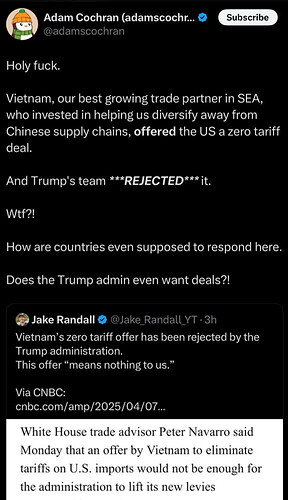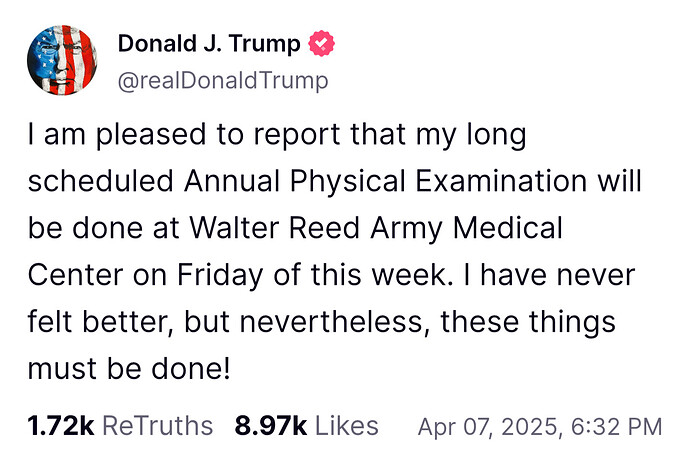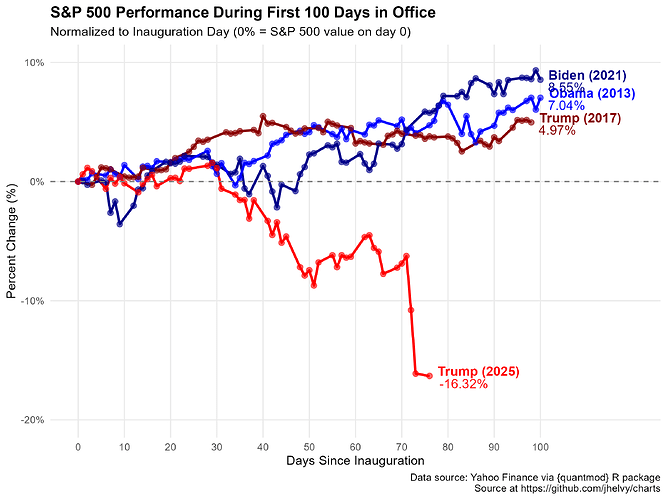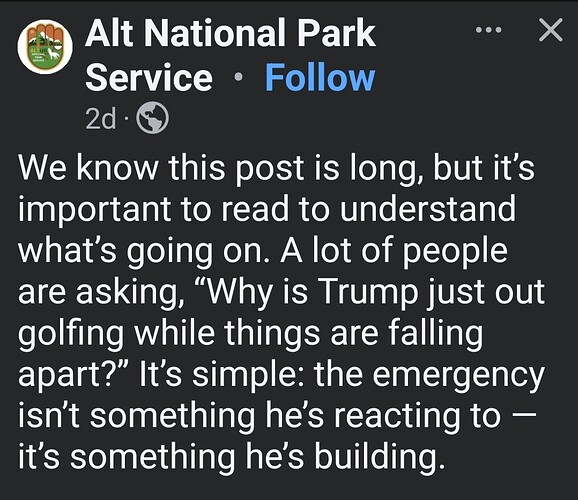Get that UV light right up your deficit crack.
Sign of the times.
I don’t know. But I’m starting to suspect that this whole mess has nothing to do with the American economy. It seems to me that it is yet another way to intimidate nations and demand unconditional obedience. If I had a tendency to imagine things, I would say he looks more like a mafia boss or warlord looking to consolidate his power.
Navarro belongs back in prison.
Nobody gives a crap.
People are panicking about their own health care while he gets the best care my money can buy.
Hey there MAGAts, still loving your narcissistic orange prima donna?
Same chart we’ve seen before, I pulled the repo and ran it today to generate the plot with current data.
Trump recently declared a national economic emergency under the International Emergency Economic Powers Act (IEEPA) — granting himself sweeping authority over international trade by labeling foreign economic practices an “unusual and extraordinary threat.”
But here’s the real play: by declaring a national emergency, Trump didn’t just respond to a crisis — he created one. And in doing so, he unlocked access to over 120 statutory powers scattered throughout federal law. Many of these powers have nothing to do with trade — and everything to do with expanding presidential authority inside the U.S.
What This Move Enables: Expanded Domestic Powers
- Control of Domestic Communications
- 47 U.S.C. §606(c): Allows the president to take control of, shut down, or regulate wire and radio communications — including the internet, social media platforms, broadcast networks, and telecom infrastructure — in the name of national defense. Originally intended for wartime, this Cold War-era law remains on the books.
- Asset Freezing and Financial Surveillance
- Under IEEPA and related laws, the president can freeze the assets and bank accounts of individuals or organizations accused of aiding foreign threats. These powers are vague and can be stretched to include domestic political groups, journalists, or activists — especially if they’re perceived as having foreign ties or influence.
**the rest**
- Domestic Military Deployment
- Under the Insurrection Act (10 U.S.C. §§ 251–255), the president can deploy active-duty U.S. military to enforce laws or suppress civil unrest within the country. In certain scenarios, this can be done without state governor consent — especially if the president claims state authorities are failing to uphold federal law.
- Emergency Detention Powers (Non-Citizens)
- The Alien Enemies Act (50 U.S.C. §21) — a law dating back to 1798 — allows the president to detain or restrict the movement of non-citizens from nations deemed hostile. The criteria for “hostile” can be broad and undefined during a declared emergency.
- Control of Energy and Transportation
- Under laws like 42 U.S.C. §6272 and others, the president can redirect or restrict domestic fuel production, electricity usage, or energy transportation. Additionally, 49 U.S.C. §40106(b) allows the president to limit, reroute, or suspend civil aviation, giving the executive branch near-total control over U.S. airspace in a crisis.
- Suspension of Labor Regulations
- During a declared emergency, the president can waive federal labor regulations and override contract protections. This includes removing limits on hours, wages, and workplace safety for federal contractors and any industries deemed vital to national security.
- National Security Letters & Warrantless Surveillance
- Emergency declarations expand the reach and use of National Security Letters (NSLs) — tools that let federal agencies demand financial, telecom, and internet records without a warrant. These also come with gag orders, preventing the recipient (e.g., Google or a bank) from disclosing that they’re under surveillance.
Why it Matters?
Even when legal domestic powers are limited, a national emergency lets the president:
- Frame the issue as a national security crisis, justifying aggressive action
- Bypass Congress and the courts by acting unilaterally
- Sway public opinion using fear, urgency, and patriotic rhetoric
Bottom Line
IEEPA is focused on foreign threats — but once the emergency is declared, the president taps into a hidden arsenal of domestic control powers. What began as a trade issue could quickly shift into civil liberties restrictions, mass surveillance, or even crackdowns under the legal shield of an “emergency.”
This isn’t just about tariffs. It’s about redefining the boundaries of executive power. Imagine if this economic crisis keeps getting worse — the amount of power he will gain.
ETA
The Team behind Mr. Trump is trying to reshape the world. I think He is being successful up to now. They doesn´t mind if they are hurting a lot of people as for them, their goal is so sublime that some risks must be taken. This reminds me of an anecdote I read a while back. When asked if He feared nuclear war, a Chinese leader said no. He claimed that there were plenty of people in the country and they could handle tens of millions of casualties without a problem.^
I wonder if this has any effect.
The guys steamrolling the society don´t care as they are high on hubris. But is very good to show them that people not gonna take it easily.
I do hope so.
But I am afraid they are only scared of ugly cars burning.
It’s nice to see a lawyer actually stepping up.
tried to seize his cellphone
So it’s okay to refuse?
It’s my birthday too so I’m going to pretend it’s for me. ![]()
No, I won’t go there. Being Canadian I’d probably wind up in an El Salvadoran prison.




